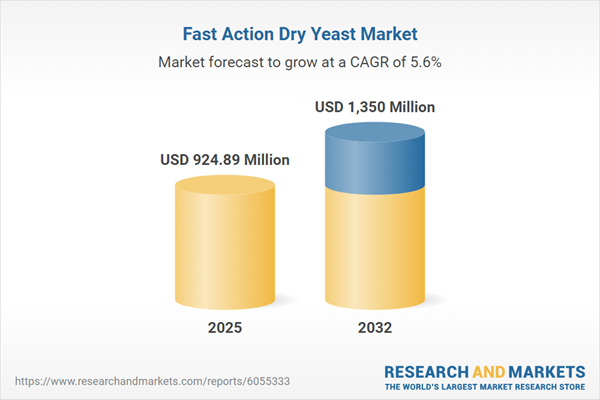Speak directly to the analyst to clarify any post sales queries you may have.
The fast action dry yeast market is driving significant changes in global food and beverage production as senior business leaders address supply reliability, efficiency, and innovation. Enterprises are redesigning their operations and strategies to remain resilient and agile amid changing industry expectations.
Market Snapshot: Fast Action Dry Yeast Market Size & Growth
The fast action dry yeast market reached USD 878.26 million in 2024 and is projected to grow to USD 924.89 million in 2025, with forecasts indicating an increase to USD 1.35 billion by 2032. This corresponds to a compound annual growth rate of 5.56%. The primary drivers of this growth are enterprise buyers who demand reliable fermentation performance, improved visibility across operations, and flexible supply chains. Category stakeholders are also expanding offerings into the food, beverage, and animal nutrition sectors, reflecting evolving needs for product variety, operational continuity, and manufacturing technology integration.
Scope & Segmentation
- Form: Granulated and powder fast action dry yeast support a broad spectrum of manufacturing and commercial uses, enabling adaptability for industrial scale-ups as well as specialized applications.
- Packaging Type: Bulk packs, individual packets, and sachets meet diverse procurement models, facilitating both high-volume operations and precise single-use production controls.
- Application: Widely utilized in alcoholic beverages, animal feed, bakery goods, and confectionery, this yeast enables efficient fermentation across large-scale and niche manufacturing environments.
- End User: Commercial bakeries, industrial confectioners, and household buyers rely on performance characteristics and sourcing reliability tailored to their operational requirements.
- Distribution Channel: Offline procurement—including supermarkets, convenience venues, and specialty stores—is integrated with digital channels to enable flexible, responsive supply chain management.
- Regions: Notable growth is observed in the Americas, Europe, Middle East & Africa, and Asia-Pacific, with companies adapting strategies to fit local regulatory contexts, consumer demands, and production capabilities.
- Key Companies: Leading players such as Lallemand, Inc.; Lesaffre International, SAS; AngelYeast Co., Ltd.; Archer Daniels Midland Company; Cargill, Incorporated; Associated British Foods PLC; Prosol S.p.A.; and regional specialists, are advancing differentiation and expanding their international presence.
Key Takeaways for Senior Decision-Makers
- Advancements in yeast strains are increasing the adaptability of production processes, supporting customized applications and clearer product distinction in competitive markets.
- Momentum toward clean-label and minimally processed yeast is shaping procurement and transparency standards, ensuring operational alignment with evolving regulations and consumer values.
- Implementation of digital monitoring and predictive analytics is enhancing manufacturing consistency, streamlining collaboration, and driving systematic process improvements.
- Regional diversification—especially in Asia-Pacific—is bolstering market resilience, enabling producers to respond efficiently to region-specific consumer and regulatory requirements.
- Strategic partnerships, including alliances and joint development initiatives, are enhancing operational agility and accelerating knowledge transfer throughout the sector.
Tariff Impact and Supply Chain Developments
Recent U.S. tariffs on yeast-related imports have shifted procurement and cost management approaches. Businesses are emphasizing local sourcing and building domestic fermentation capabilities, while introducing circular economy models such as upcycled raw materials. These supply chain improvements strengthen risk management and ensure business continuity in response to changing trade environments and global logistics challenges.
Methodology & Data Sources
This analysis is based on executive interviews and a review of validated secondary sources. Independent subject matter experts have confirmed the accuracy and dependability of the findings to support decision-making at the leadership level.
Why This Report Matters
- Enables procurement and sourcing teams to optimize supply chain performance and manage risks across evolving fast action dry yeast networks.
- Empowers executives to align operations with regulatory and technology trends, developing adaptive strategies as market conditions change.
- Provides benchmarking and intelligence for preparing region-specific plans and addressing regulatory developments.
Conclusion
This report supports senior decision-makers with the insights needed to guide sustained growth and operational resilience in a rapidly changing market shaped by technological advancement and evolving trade conditions.
Table of Contents
3. Executive Summary
4. Market Overview
7. Cumulative Impact of Artificial Intelligence 2025
Companies Mentioned
The companies profiled in this Fast Action Dry Yeast Market report include:- Lallemand, Inc.
- Lesaffre International, SAS
- AngelYeast Co., Ltd.
- Archer Daniels Midland Company
- Arishtam Probiotics
- Arkopharma SAS
- Asahi Group Holdings, Ltd.
- Associated British Foods PLC
- Biorigin
- Bioven Ingredients
- Cargill, Incorporated
- Eklavya Biotech Private Limited
- Gutbasket
- Hi Media Laboratories Private Limited
- Kerry Group plc
- LaBudde Group, Incorporated
- Leiber GmbH
- Levapan S.A.
- MP Biomedicals, LLC
- Nisshin Seifun Group Inc.
- NOW Health Group, Inc.
- Prosol S.p.A.
- Solgar Inc. by Nestlé Health Science
- Thermo Fisher Scientific Inc.
- Titan Biotech Limited
- Tollisan BV
Table Information
| Report Attribute | Details |
|---|---|
| No. of Pages | 183 |
| Published | October 2025 |
| Forecast Period | 2025 - 2032 |
| Estimated Market Value ( USD | $ 924.89 Million |
| Forecasted Market Value ( USD | $ 1350 Million |
| Compound Annual Growth Rate | 5.5% |
| Regions Covered | Global |
| No. of Companies Mentioned | 27 |









